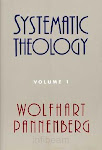3 weeks ago
Wednesday, 18 June 2008
After Virtue - part 2 (of 6)
1. Where Are We Now, and Why?
2. “Enlightened” Europe
3. Turning point: Nietzsche or Aristotle?
4. Pagan vs. Christian Virtues
5. After Virtue
6. MacIntyre’s Answer
2. “Enlightened” Europe
MacIntyre argues that the Enlightenment Project had to fail. The root of the problem was the “discrepancy between rules and human nature” – in other words a false anthropology and understanding of the interconnectedness of nature and rules.
The paradigm before the Enlightenment was Aristotelian-Christian. Aristotle provided the teleological scheme of man-as-he-is and man-as-he-could-be-telos. Theism added the concept of divine law. Reason and revelation.
However, Protestantism and Jansenist Catholicism devalued reason, the author claims. This secular rejection of theology coincided with the scientific-philosophical rejection of Aristotelianism – telos was eliminated, essential human nature lost.
MacIntyre is adamant of this being a horrendous blunder, not only ethically, but logically.
Interestingly, he says – contrary to much modern philosophical thought – the famous maxim “no ought from is” is mistaken. “No ought from is” not a “timeless logical truth”, as some claim, yet even today it infects moral philosophy. Functional concepts include (intrinsic) value and purpose: man and living well is analogous to harpist and playing the harp well.
“Today’s moral judgements are linguistic survivals from theism which have lost the context,” he writes. What is felt as “liberation” he calls “loss”.
The individual has been freed from hierarchy and teleology. Quite naturally, MacIntyre notes, some new teleology or categorical status was and is needed: utilitarianism and Kant respectively. However, both failed and fail, he says, though they accomplished social transformations. In the end, “pleasure” and “happiness” remain vague and useless pseudo-concepts.
Consequently, autonomous moral agents are now trying to protect their autonomy. Hence the key modern concepts: rights, to protest, to unmask. “Human rights”, too, are only alleged rights – they cannot be demonstrated “as a matter of fact”. Emotivism unmasks arbitrary will and desire in all human activity.
But emotivism, as a theory, has – as all theories have – practical consequences as well. MacIntyre says emotivism “embodies society”. The characters that embody emotivism are, above all, the aesthete, therapist, and manager (or expert). All trade on moral fictions.
In Chapter 7 MacIntyre addresses there other modern concepts, fact, explanation, and expertise. So-called “facts” deserve attention.
“Fact”, according to MacIntyre, is in modern culture a “folk-concept with aristocratic roots”. It is commonly seen that scholastics were deceived by interposing Aristotelianism, but “moderns” stripped away interpretation and theory and found “fact” and “experience” as they are. (I’m afraid Kuhn’s brilliant The Structure of Scientific Revolutions has not, perhaps because of its unwillingness to resort to “truth”, managed to wholly dispel this myth.)
This fallacy is typical to the Enlightenment which, MacIntyre wittily comments, is “par excellence when most intellectuals lacked self-knowledge”. The modern contrast of morality and human science was alien to classicism because the value/fact contrast was also alien.
The following chapter, “Generalizations in Social Science and their Lack of Predictive Power”, was a very intriguing one. Basically, the author claims most social sciences are tautologous!
The task of social scientists is to produce law-like generalisations, he says. But they never do. The predictive ineptitude of the economist he thinks is “innocent”: at least the economist goes public when his predictions fail. The sociologist and political scientist (or futurologists), on the other hand, never advertise failures. Psycho-babble provides the camouflage.
But Machiavelli was different. Why? Because of his concept of Fortuna.
Life incorporates radical sources of unpredictability, and Machiavelli knew this (as did Karl Popper and others). But since the Enlightenment (and Marx) the widespread belief holds that unpredictability will be overcome in the progressive future.
MacIntyre, however, believes that the “bitch-goddess of unpredictability cannot be dethroned”. He believes in Fortuna’s permanence because of empirical facts. Totalitarianism (total predictability) destroys success – Huxley’s and Orwell’s worlds are impossible. Innovation is required. The idea of “bureaucratic managerial expertise” he rejects as illusion. For him, the best bureaucratic manager is (or must be, for no fault of his) the best actor.
Subscribe to:
Post Comments (Atom)







No comments:
Post a Comment